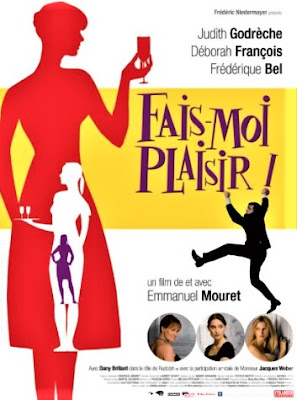Ariane (Frédérique Bel) is the girlfriend of Jean-Jacques (Emmanuel Mouret) and sees him as fantasising about Élisabeth (Judith Godrèche), considering that the only way out of the problem is to have sex with the woman to get it out of his system.
This film is different from Vénus et Fleur in that it belongs more to the world of slapstick, and instead of having the director appearing as a Hitchcockian extra he's the main character. This last point, along with the preoccupation with sex, links it to Woody Allen films, although the improbable (indeed sometimes impossible) gags are more in the territory of Jacques Tati: the ingénu tied up in a world with which he is out of sorts leads him into absurd, even surrealistic, situations.
The key drive behind the initial action here is a the ability of a man (Frédéric Épaud) to make women fall for him by having a piece of paper given to them: this contains such charming words that they act as a kind of magic spell on the women. By accident, Jean-Jacques has come into possession of one of the papers and the spell has worked on Élizabeth.
He goes along to a function she's invited him to and the Tati element begins: he's caught up in a plush, modern world which the famous and powerful inhabit, and which is out of kilter with a man of modest means who drives a wreck of a car. First he has to find the verbal key to make the lift work; then he meets the president (Élizabeth being his daughter); his finger gets stuck in a vase and the prime minister of Japan helps him get it out; he drops a mobile phone into an ornamental toilet with a statue of a naked woman on top; he gets his flies caught in a curtain: it's a repeating helter-skelter situation in which Jean-Jacques is the dummy who can't put a foot right. But contrived as this all may sound, it's highly enjoyable because Mouret has a knack of making it work without at the same time making it appear stupid.




No comments:
Post a Comment